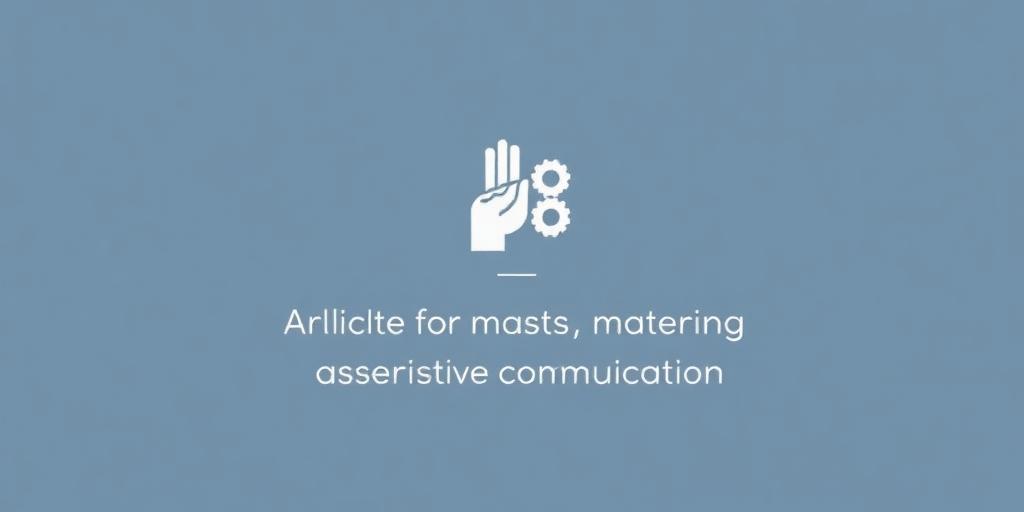The Art of Saying No Without Guilt: Mastering Assertive Communication
In a world that often rewards boundless enthusiasm and unwavering availability, the simple act of saying "no" can feel like navigating a minefield. For many, the word is laden with a sense of dread, followed closely by a wave of guilt. This hesitation stems from a deeply ingrained desire to please, to be seen as helpful, and to avoid perceived conflict or disappointment. Yet, the inability to decline gracefully often leads to overcommitment, burnout, and a profound erosion of personal well-being. Mastering the art of saying no without guilt is not a selfish act; it is a fundamental skill for personal and professional sustainability.
The Core Challenge: Why Saying "No" Feels So Hard
Our reluctance to utter that two-letter word often traces back to several core fears. We fear disappointing others, appearing uncooperative, or missing out on opportunities. This leads to a pervasive people-pleasing tendency, where our desire for external validation overrides our internal needs. The consequence? A perpetually overflowing plate, a dwindling reserve of energy, and a growing sense of resentment. When we constantly say "yes" out of obligation, we inadvertently say "no" to our own priorities, our rest, and our personal development.
The Transformative Power of Boundaries
Understanding that saying "no" is synonymous with setting healthy boundaries is a critical shift in perspective. Boundaries are not walls designed to keep people out; they are clear lines that define what is acceptable and what is not. They communicate respect for your time, energy, and values. Establishing these limits is an act of self-preservation, ensuring you have the bandwidth for what truly matters and preventing external demands from dictating your life. This assertiveness in communication leads to improved mental clarity, reduced stress, and ultimately, a more fulfilling existence.
Mastering the Art: Practical Strategies for Declining Gracefully
While the concept may seem daunting, effective ways to say no can be learned and refined. Here are several authoritative strategies to help you decline requests without feeling bad:
- Be Clear and Concise: Avoid lengthy apologies or convoluted excuses. A simple, direct, and polite refusal is often the most effective. "Thank you for thinking of me, but I won't be able to take that on right now."
- Offer Alternatives (When Appropriate): If you genuinely want to help but cannot commit to the specific request, offer a different solution or suggest another person. "I can't lead that project, but I could offer some guidance on the initial planning phase," or "I'm not available, but have you considered reaching out to [colleague's name]?"
- The "Pause" Technique: Do not feel pressured to give an immediate answer. "Let me check my schedule and get back to you" provides valuable time to assess your capacity and formulate a thoughtful response. This also helps in overcoming people-pleasing by giving you control.
- Prioritize Your "Yes": Every "no" to one thing is a "yes" to something else. By declining extraneous requests, you affirm your commitment to existing priorities, whether they be work projects, family time, or personal well-being.
- Separate the Request from the Person: Remember, you are declining the request or task, not rejecting the individual. This distinction helps to alleviate personal guilt and maintain positive relationships.
- Practice and Persistence: Like any skill, assertiveness in communication improves with practice. Start with smaller, less significant requests and gradually build your confidence. The initial discomfort will lessen over time.
Reframing Guilt: From Burden to Boundary Guardian
It is natural to experience a flicker of guilt, especially when you are accustomed to always saying "yes." However, view this feeling not as a sign of wrongdoing, but as an indicator that you are establishing a new, healthier pattern. This initial discomfort is merely your old habits resisting change. Over time, you will begin to reframe this feeling, understanding that setting boundaries without feeling bad is an act of self-respect and integrity. You are not responsible for managing others' reactions to your personal limits; your primary responsibility is to honor your own needs and commitments.
Ultimately, saying no without guilt is not about selfishness; it's about strategic self-care. It empowers you to protect your time, energy, and mental health, allowing you to invest fully in the commitments that truly align with your goals and values. By embracing this essential skill, you will not only reduce stress and prevent burnout but also foster healthier, more authentic relationships based on mutual respect rather than obligation.









